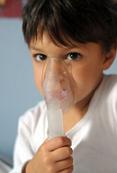Advertisment
Mum’s worries linked to kid’s asthma

Adolescents with asthma reported worse symptoms of breathlessness when they had anxious mothers, and the link may have more to do with genes than environment, researchers suggested.
Findings from a Swedish twin study shows that maternal anxiety was significantly associated with adolescent asthma (odds ratio 2.02, 95% CI 1.15-3.55) reported by the mother on one anxiety measure, and it was significantly associated with breathlessness (OR 1.74, CI 1.04-2.91) reported by the adolescent on several anxiety measures, according to Catarina Almqvist, MD, PhD, from the Karolinska Institutet in Stockholm, and colleagues.
Several previous investigators have shown an association between maternal anxiety and asthma occurrence and symptom severity in offspring, but the study is the first to examine the issue in twins, the researchers said in the June issue of the journal PLOS ONE.
The study included data from the two-part, cross-sectional Twin and Offspring Study of Sweden (TOSS), which contains information on more than 195,000 twins born in that country since 1885.
“The children-of-twins design was used to address the issue of whether an association between maternal anxiety and offspring asthma is caused by family-side, environmental and/or genetic factors,” they wrote.
They also utilized child reports and objective measures of asthma in an effort to address the issue of rater bias.
The analysis included 1,691 mothers who were either twins or partners of male twins and their adolescent children (mean age of about 16). Maternal anxiety was assessed using three questionnaire-based measures: the Karolinska Scales of Personality (KSP) somatic and psychic anxiety, as well as the Beck Anxiety Inventory (BAI).
Asthma and asthma symptom severity assessments were assessed using subjective (maternal or child report) or objective (register-based diagnosis and medication) measures.
Among the study’s findings, maternal anxiety was not significantly associated with an increased risk for the register-based outcomes of asthma diagnosis or medication use. In fact, an inverse association was shown for medication use on the KSP somatic anxiety questionnaire (OR=0.56, 95% CI 0.34-0.92).
For levels of KSP somatic anxiety, there was no difference in the prevalence of asthma reported by the mother — low anxiety level 9.6%, moderate 8.4%, and high 8.8% of asthma) or asthma reported by the child. This was also true for KSP psychic anxiety.
When maternal anxiety was assessed with BAI, however, asthma reported by mother (low 6.5%, moderate 7.5%, and high 12.3%) and child, as well as breathlessness reported by the child, increased with increasing maternal anxiety.
All measures showed increasing prevalence of breathlessness reported by the child to be significantly associated with increased maternal anxiety.
The study had some limitations, namely the cross-sectional design, which prevented any analysis of causal direction of the associations. Also, single parents were excluded from TOSS leading to a study population with a slightly higher economic status.
The researchers concluded that future studies should have a longitudinal perspective and take all known aspects of asthma into consideration.
“Combined with aspects of changes in gene expression, and a clearer understanding of the genetics of asthma, this can facilitate attempts to suggest future public health interventions,” they wrote.
Disclosure:
The study was supported by grants from the National Institute of Mental Health, the Swedish Research Council, the Swedish Heart and Lung Foundation, and the Strategic Research Program in Epidemiology at Karolinska Institutet. Financial support was provided by the Stockholm County Council and Karolinska Institutet.
The authors declare no conflicts of interest.
Reference:





